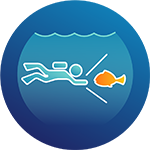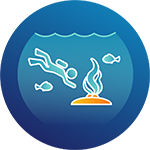
Biological Oceanography
The Interaction between Marine Life and the Ocean
Because the ocean contains 99% of the living space on Earth and covers over 70% of Earth’s surface, its composition significantly impacts all life. This is true whether you live on the coast or thousands of miles away from the nearest beach. Oceanographers study the role of oceans in the big picture of Earth’s various ecosystems and the ways in which both the ocean impacts life on Earth and Earth affects life in the ocean. Oceanography can be divided into four sub-disciplines: chemical oceanography, physical oceanography, geological oceanography, and biological oceanography, the subject of this snapshot. These sub-disciplines are interrelated and closely aligned to other ocean-related fields such as marine biology, ocean engineering, atmospheric science, and marine microbiology.
Biological oceanography is the study of the ocean through the lens of marine life – how living organisms affect and are affected by ocean chemistry, physics, and geology. The goal of biological oceanography is to understand what controls the abundances, kinds, and temporal variation of organisms in the sea.[1] Biological oceanography pays particular attention to the effects of the ocean’s chemical, physical and geographic properties and how these affect the distribution and abundance of marine organisms. Biological oceanographers also examine “all forms of oceanic processes that involve living organisms . . . including processes that occur at molecular scales, such as photosynthesis, respiration, and cycling of essential nutrients, to largescale processes such as effects of ocean currents on marine productivity.”[2]
Biological oceanography is a study of extremes in both size, depth, and location. Biological oceanographers study tiny microbes and giant blue whales. Biological oceanographers study cyanobacteria blooms covering thousands of square kilometers of the ocean’s surface and hydrothermal vent colonies thousands of feet below that surface. And biological oceanographers conduct their experiments on the swaying decks of research vessels out at sea or in labs in university science buildings.[3]
Research areas that are of current interest to biological oceanographers include the following:
- Chemical and physical factors influencing distribution patterns;
- Physiological, behavioral, and biochemical adaptations to environmental variables, including natural variations in food, temperature, pressure, light, and the chemical environment;
- Food chain dynamics;
- Nutrient cycling and initial steps of chemical energy fixation; and
- Responses to the results of man’s activities in the oceans.
Biological oceanography often gets confused with marine biology. And while biological oceanography has many similarities to marine biology, they are two distinct areas of marine science. While marine biologists study the ocean’s plants, animals, and protists, biological oceanographers study marine organisms and their biological processes within the context of their natural environment.[4]
…
Citations
- Biological Oceanography, School of Oceanography, University of Washington.
- Oceanography, Biological, Water Encyclopedia.
- Biological Oceanography, MIT-WHOI Joint Program.
- Oceanography, Marine Careers, NH Sea Grant.

The Path to Becoming a Biological Oceanographer
From High School to Your First Job
Build a Solid Academic Foundation
Basics:
Take all available STEM-related courses (chemistry, biology, physics, computer science, algebra, geometry, calculus) offered at your high school. Take all these classes at the most advanced level possible (honors, AP). This will help you build your knowledge base in scientific theory and concepts.
Recommended:
If not available at your high school, take ocean science-related (oceanography, marine biology, marine microbiology, coastal science), chemistry-related (inorganic chemistry, biochemistry, geochemistry), and physic-related (biophysics, thermodynamics, acoustics, geophysics) classes offered online.
Keep in Mind:
Gain lab work experience through a research internship. Learn how to write for a scientific and non-scientific audience. The ability to communicate in writing cannot be overstated. Given the international nature of scientific collaboration, become fluent in a foreign language. Be a voracious reader.
Dive In!
And become an expert
![]()
Peruse our library of must-read books
![]()
Thumb through a scientific publication
Take an online course
![]()
Watch an interesting video
![]()
Check out these great websites
Get a

jump on your Academic career
There’s no substitute for experience.
We have compiled a database of thousands of internships, research opportunities, academic programs and specialized training programs so you can get a jump on your academic career.
Internships
Research
Academic Training Programs
And if you need support to fulfill your dreams and ambitions, our searchable database has plenty of scholarship opportunities as well as programs designed to increase diversity in the sciences.
Scholarships
Diversity, Equity & Inclusion
Need Help Finding Your Opportunity?
Our video tutorials explain the ins and outs of landing a great internship, research project or training program.
Make all the right moves
Advice from those who know
Maintain an excellent GPA, especially in the sciences
Have some work experience on your resume
Attend professional conferences and biological oceanography seminars
Obtain lab experience and become familiar with lab instrumentation
Present your research at student research colloquiums
Build experience through internships or as an undergraduate researcher
Join professional societies and organizations
Stay current by reading professional and scientific journals
Learn about current research projects
What degree is right for you?

Bachelor’s Degree
A bachelor’s degree is required for all entry-level jobs, but your advancement will be limited. You should obtain a degree in oceanography or something either closely related (marine biology, marine microbiology, coastal science) or complementary (biogeochemistry, atmospheric sciences). Familiarity with lab techniques, computer modeling, and the use of scientific instrumentation is essential.
Master’s Degree
A master’s degree is highly recommended as this is where you will be able to begin to specialize your studies in biological oceanography. A master’s degree will open up more opportunities with both federal and state government agencies as well as with various companies in the private sector. In a master’s program, you will learn the theory and the practice of biological oceanography in addition to having the opportunity to engage in challenging fieldwork.
Doctoral Degree
A doctoral degree is required if you want to pursue a career as a university professor or researcher. Senior research positions with federal (NOAA, Bureau of Ocean Energy Management) and state (Environmental Protection, Fish and Wildlife) government agencies and senior project manager positions with private corporations (environmental consulting, pharmaceuticals) may require a doctoral degree. This is also true for high-level positions with nongovernmental organizations and nonprofit organizations.
10 Schools With Excellent Biological Oceanography Programs
Want to see the full list of colleges and universities with degree offerings or relevant courses?
Ocean Science
Skidaway Institute of Oceanography, University of Georgia
Oceanography
Hawaii Pacific University
Ocean Sciences
Oregon State University
Oceanography
Rosenstiel School of Marine and Atmospheric Science, University of Miami
Oceanic and Atmospheric Sciences
Scripps Institution of Oceanography, UC San Diego
Oceanography
University of Washington School of Oceanography
Oceanography
University of Delaware
Oceanography
Cal Poly Humboldt
Oceanography
Texas A&M University
Oceanography
Florida Institute of Technology
![]()
Tip 1
Given the interdisciplinary nature of biological oceanography, you can still pursue a career in the field even if your school does not have a biological oceanography major. You can major in biology, chemistry, or physics.
![]()
Tip 2
Don’t just consider a school’s undergraduate offerings. Even if a school does not offer biological oceanography as a specific major at the undergraduate level, you may eventually be able to take relevant classes at the graduate level.
![]()
Tip 3
Get out in the field as soon as possible to gain real-world experience and perspective. Internships, fellowships, and research opportunities are available to college students interested in biological oceanography or other ocean sciences.
Have familiarity with one or more of the following areas

Field survey and analytical techniques

Marine remote sensing

Underwater photography and imagery

Scientific diving

Navigation

Robotics

Geophysical survey

Oceanographic sampling

Marine Geographic Information Systems

Marine field data collection and analysis
Typical Job Functions of a Biological Oceanographer
Here are some of the interesting things you could be doing.
Planning and carrying out research expeditions.
Performing data collection, analysis, and reporting of ocean environmental processes.
Considering the ecological, biological, chemical, physical, and geological impact of marine life.
Mapping the distribution, ranges, or movements of marine populations.
Managing teams of scientists during data collection and analysis of information.
Performing simulations of ocean phenomena using mathematical models.
Analyzing the health of various components of the marine environment.
Using computer modeling to make predictions about the marine ecosystem.
Assisting with hydrographic and geophysical surveys, data collection, and processing as they impact marine biology.
Spending time at sea collecting samples and data using specialized equipment and techniques.
Understanding and interpreting oceanic processes.
There’s an Ocean of Possibilities
The interdisciplinary nature of biological oceanography will also allow you to satisfy your other ocean science-related interests.
Common employers include:
Federal Government Agencies
- U.S. Environmental Protection Agency
- National Oceanic and Atmospheric Administration
- U.S. Geological Survey
- Natural Resources Conservation Service
- Bureau of Ocean Energy Management
Military
- U.S. Navy
- National Defense Research Establishments
- Centers for Disease Control and Prevention
- National Institutes of Health
- National Science Foundation
State Government Agencies
- Environmental Protection
- Fish and Wildlife
Private Industry
- Pharmaceuticals
- Emerging Technology
- Environmental Consulting
- Marine Transportation
- Offshore Renewable Energy
- Private Laboratories
Non-Governmental Organizations
- Environmental Organizations
- Conservation Organizations
Academia
- Universities
- Research Institutions
Start your career search with our extensive list of employment websites.
